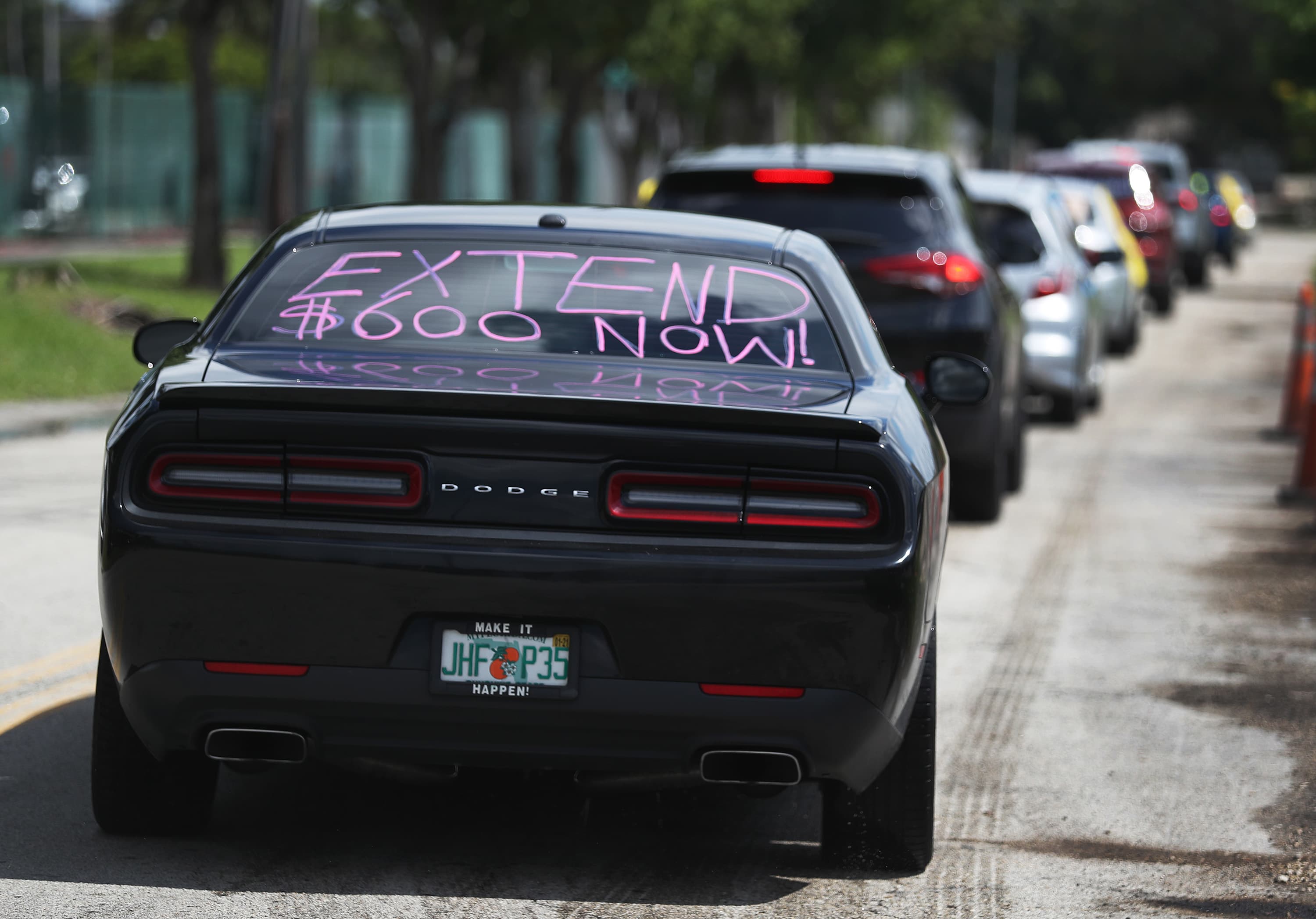In the $1 trillion stimulus proposal released by Senate Republicans on Monday — the Health, Economic Assistance, Liability Protection and Schools, or HEALS, Act — the $600 per week unemployment boost of the CARES Act, which expires Friday, would decrease to $200 per week.
That’s because Republican leaders have largely said the extra $600 a week discourages people from returning to work.
Though there have been reports of some businesses unable to find employees because of the booster (i.e., potential hires were making more money on unemployment than they would working a particular job), a report from Yale economists published on July 14 found that the extra $600 is not the primary reason people are, or are not, working.
The Yale research showed that low wage workers and workers from states where unemployment benefits are lower — so those for whom the $600 supplement increased their total unemployment benefits by a bigger percentage — “did not experience larger declines in employment when the benefits expansion went into effect,” the report said.
Those unemployed people returned to their previous jobs at similar rates as others, according to the report.
“In fact, if anything, groups facing larger increases in benefit generosity experience slight gains in employment relative to the least-treated group by early May,” said the report.
Instead, the most important factor in whether people returned to work was the availability of jobs, according to Joseph G. Altonji, the Thomas DeWitt Cuyler Professor of Economics at Yale University, and Dana Scott, a graduate student and Ph.D. candidate at Yale’s economics department, who co-authored the report.
“We think the reason for the lack of difference is that scarce job opportunities rather than labor supply has been the main factor in determining employment during the pandemic,” the report co-authors tell CNBC Make It.
“While some people may have chosen not to look for work because of the generosity of [unemployment] benefits, the dominating factor in employment levels has been low labor demand,” they said.
For the report, the Yale economists used weekly data from Homebase, a company that provides employment and time-tracking software to U.S. small businesses like restaurants, bars and retail operations — the sort of small businesses with “hourly employees who earn relatively low wages” and are likely “disproportionately affected by the pandemic,” according to a Yale press release.
The economists compared the week of March 22, just before the CARES Act was passed, to the weeks following.
Separately, research from the Chicago Federal Reserve also shows that those individuals who have stopped receiving their unemployment benefits are much less likely to continue looking for work than those who are still receiving benefits. Once benefits run out, “their search effort drops precipitously,” the report said.
For the study, researchers measured the number of hours in a week people spent searching for a job and the number of job applications they sent in the past month, and ”those currently collecting benefits search more than twice as intensely as those who have exhausted their benefits.”
In the United States, unemployed people are typically eligible for six months of unemployment insurance benefits, and though the unemployment insurance varies by state, they tend to pay about 35% of previous earnings until they find a new job or the benefit runs out, the authors of the Chicago Fed research say. Also, to receive unemployment benefits you must be actively seeking work to claim the benefits, though what unemployed people have to do to prove they are actively seeking employment varies by state.
Regardless of how the benefits affect individual incentive to work, many economists agree some unemployment booster is critical for buoying the economy.
Ernie Tedeschi, a former Treasury Department official and an economist at Evercore ISI Research, says that if the $600 unemployment booster is not extended through the end of the year, it will cost the economy 2% in gross domestic product growth and there would be 1.7 million fewer jobs.
“Unemployment insurance goes to people who need it. And because it generally goes to low- and middle-income workers, they’re very likely to spend it,” Tedeschi told NPR in July.
The argument that giving people money disincentivizes them to work has also been used as point against the idea of universal basic income, or UBI.
While research into the effects of UBI in the United States is still limited, early results of a pilot program currently underway in Stockton, California were recently released. For that program, 125 residents are being given $500 a month for 24 months. According to the executive director of the program, Sukhi Samra, its recipients have left second or third jobs, but there has been no data showing that recipients have stopped working, she told CalMatters.Org.
See also:
Jeff Bezos’ ex MacKenzie Scott on her wealth and donating $1.7 billion
Why Elon Musk says a stimulus package ‘is not in the best interests of the people’
Cash payments to 2.7 billion people living in poverty would slow Covid-19 spread: report
